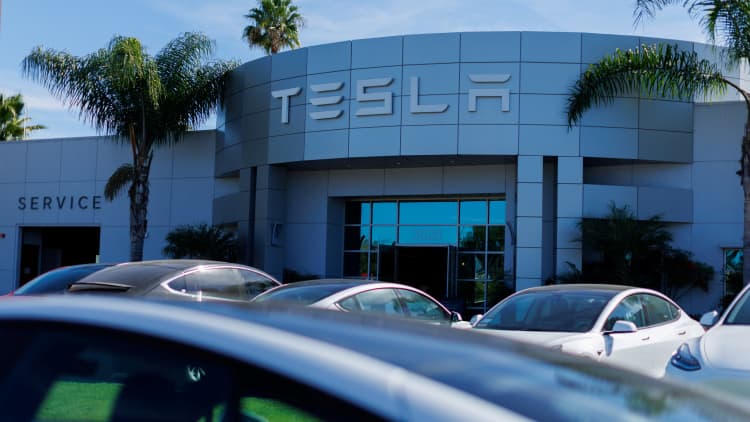China’s Xiaomi is selling so many electric cars it’s closer to breaking even

The Xiaomi SU7 on display at the Mobile World Congress 2024.
Arjun Kharpal | CNBC
BEIJING — Chinese smartphone company Xiaomi‘s new electric vehicle is selling better than expected, putting it closer to break-even despite undercutting Tesla‘s Model 3 on price.
Xiaomi has received more than 70,000 orders for its electric SU7 sedan as of April 20, close to the company’s original full-year target for deliveries this year, CEO Lei Jun told investors Tuesday.
The company now aims to deliver 100,000 of its new EV this year, he said.
Xiaomi released the SU7 in late March with a price about $4,000 less than Tesla’s Model 3, and has started deliveries. The Chinese smartphone company is set to livestream a car update at 9:20 a.m. on Thursday, as the Beijing auto show kicks off.
“Breakeven would be realized if annual sales reach 300[k]-400k,” Citi analysts said in a report, citing the investor day. They raised their autos segment gross profit margin forecast to 6% this year, versus a 10% loss previously expected.

The Citi analysts raised their earnings per share forecast by 25% this year, and now expect Xiaomi to ship 100,000 cars this year, 200,000 next year and 280,000 in 2026.
For context, Tesla China sold more than 600,000 cars last year, according to the China Passenger Car Association. Li Auto, which technically sells mostly hybrids, sold 376,000 cars last year, while Nio sold just over 160,000 cars last year, the data showed.
Li Auto had a gross margin of 23.5% in the fourth quarter last year, while Nio’s gross margin was 7.5%, both up from the year-ago period.
Tesla’s gross margin has successively declined over the past five quarters to 17.4% in the first three months of this year. Gross margin figures don’t account for operating expenses.
When Xiaomi launched the SU7 last month, Lei said the company would be selling each car at a loss.
But on Tuesday, he estimated gross profit margin of around 5% to 10% for Xiaomi’s auto business, and noted that sales are greater than expected, while expressing thanks to suppliers on reducing costs.
“We are currently in discussions with supply chain partners on how to increase production capacity and further support on costs,” he said, according to a CNBC translation of a Chinese-language investor day transcript provided by the company.
Sticking to China for now
Xiaomi has invested heavily in its electric car venture as Lei has long-term ambitions to become one of the top five automakers in the world.
But for the next three years, the company plans to fully focus on the domestic market, he told investors Tuesday.
Lei pointed out that Xiaomi already does business in more than 100 countries.
“We have a foundation of global influence and Xiaomi fans,” Lei said. “When we are ready to enter the global market, it should come naturally.”
Xiaomi also has plans for its next electric car, an SUV, set to be released in the second half of 2025, Chinese business news site 36kr reported Wednesday, citing sources.
Lei declined to share details when asked about SUV plans on Tuesday.
“I think one of the reasons for the success of SU7’s launch was its confidentiality,” he added.







